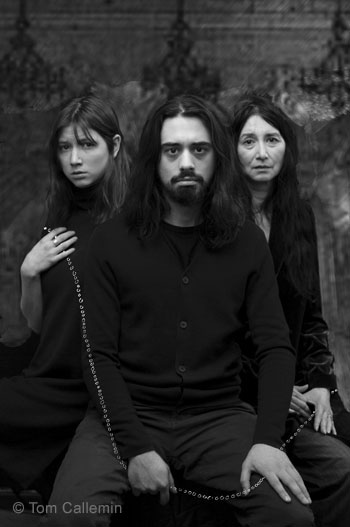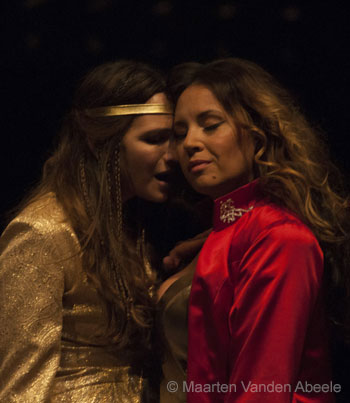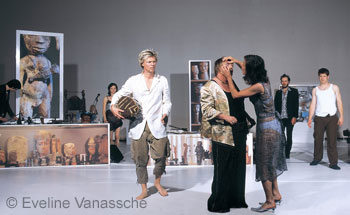


|
||
Dear All, 1st Concept: ‘Survival by collaboration’ 2nd Concept: ‘Everything is politics, but art isn’t everything’ What actually happened here: Lamers is dear to my heart. As a young artist I learnt a great deal from him. I learned from him what ‘sincere illusion’ is. By means of this sincerity he fundamentally changed Dutch-language theatre. In his view, it is not fitting for a theatre-maker these days to try to mislead the audience with insincere illusions. So he assumed that it was real petrol and the theatre-maker was a real activist. But Chokri was just an old-fashioned ‘libertine’ full of good intentions, who in this way undermined every sincere activist, including Jan Palach and Mohamed Bouazizi. This arises as a result of the persistent illusion that everything has to be political, without the reservation that art isn’t everything. And what about changing petrol into water? Leave that to the gods. 3rd Concept: ‘Specialisation leads to degeneration’ 4th Concept: ‘What happens on stage stays on stage’ We have to be careful and not lump everything together. It looks as if the unacceptable behaviour is due to the sort of art that Fabre creates. But of course that actually has nothing to do with it. Physical exhaustion? What goes on in contemporary dance and performance pales into insignificance when you compare it to classical ballet training. Just try dancing in pointe shoes. So it’s certainly not the invention of one or other generation from the 1980s. It’s already 25 years since I wrote that the idea of ‘performance’ and such notions as the threshold of pain and exhaustion cannot be combined with my idea of theatre. I made my last ‘physically’ exhausting performance in 1985 and at that point I realised that I had to go in a different direction. Seeking the threshold of pain is something I can only ask of myself, never of the people I work with, because this is soon accompanied by intimidation. I don’t find the use of violence and exhaustion of any interest for my work. Which doesn’t mean that I can’t appreciate it in other artists’ work. I have read in several papers that the old generation and old organisations are to blame for everything. But one young theatre-maker, Julie Cafmeyer, has said that she herself saw an actor foaming at the mouth from exhaustion collapse on the floor while she stood at the side shouting. Well, I have to say that this could not happen at Needcompany. We simply wouldn’t allow it. In 1987 I changed the structure of the company because as a young theatre-maker I had started to get too big for my boots. One can genuinely make extreme theatre in a gentle and loving manner. And we should stop talking about generations; it should be about organisations, structures and individuals. We are very upset about this affair; it must lead to something positive. The enquiry and self-examination must be carried out thoroughly. The open letter from the twenty ex-Troubleyn performers will have a healing effect. I would like to invite everyone to come and visit us at the MILL. Spend some time watching one of our rehearsals and you will see how delicate, agreeable and interesting it is. And I sincerely believe that this is also the case in most other companies, of both the ‘old’ generation and the new. | ||
 |
Hamlet Lisaboa Houbrechts & Kuiperskaai are putting the real Lauwers-Barkey family on stage in order to portray the canonical Hamlet family. In doing so, they are attempting to penetrate the essence of this primal tragedy. For this Hamlet, Lisaboa Houbrechts asked the actress Grace Ellen Barkey to play the part of the combative Gertrude. She will make her first appearance in a Kuiperskaai production together with her son Victor Lauwers as Prince Hamlet and her daughter Romy Louise Lauwers as Ophelia. Needcompany is the co-producer. | |
|
Hamlet is being produced as part of the P.U.L.S. initiative set up by Toneelhuis to enable talented young theatre-makers to develop towards the larger stage at their own tempo. Several internationally renowned theatre-makers are keeping their eye on their work as associates and discussion partners, including Jan Lauwers. The premiere is at Toneelhuis on 22 September. It will then tour Belgium, the Netherlands and France. You will find more info, tickets and a complete list of performances at Toneelhuis.be and Facebook. |
||
EXPLO I @ MILL | ||
|
In 2017, Needcompany moved to the former Gosset tobacco factory in Sint-Jans-Molenbeek. This house of many rooms was given the name MILL and it signals the start of a new phase in our thirty-year existence. On 25 and 26 October 2018, MILL will be open to all during EXPLO I, an exclusive two-day event packed with performances, exhibitions and films. The programme includes an insight into the work of Emma van der Put, Maarten Seghers, Oscar van der Put, Simon Lenski, Nicolas Rombouts, Lot Lemm, Nicolas Field, Rombout Willems, Maarten Vanden Abeele, Jan Lauwers, Maarten van der Put, Grace Ellen Barkey, Fritz Welch, Benoît Gob, Lisaboa Houbrechts, Victor Lauwers, Romy Louise Lauwers, Lobke Leirens, Seppe Decubber and Maxime Rouquart. Complete programme and how to register: www.needcompany.org. At the same time as EXPLO I, an exhibition of Jan Lauwers’ visual work entitled WATERCOLOURS FROM MILL’S CREEK will open at the Kusseneers Gallery. | ||
|
Concert by a Band Facing the Wrong Way | ||
|
"is so potent that shy laughter is heard at the most humorous moments, like when, at the end of a performance, you don’t know whether you should stand up to applaud or not, and look around to see what the others are doing. At such moments the performance works perfectly. It exposes the attitude of the audience – which is used to references and needs them so as to know what to hold on to. Not only does the artist want to please, but the audience also wants to be pleased and guided. Fascinating." |
||
|
Concert by a Band Facing the Wrong Way, the new Needcompany production by and with Maarten Seghers, Nicolas Field and Rombout Willems, is a portrait of a bunch of Western artists who run inexhaustibly straight ahead; it’s unclear whether they are fleeing all the misery of the world or are actually dashing towards it. |
||
|
Following its success in Poznan and Barcelona, the production can still be seen at the Festival Actoral in Marseille on 11 and 12 October and during EXPLO I in Brussels on 25 and 26 October. |
||
 |
L'incoronazione di Poppea In August, Monteverdi’s L'incoronazione di Poppea premiered in Salzburg. The musical director was William Christie, and Jan Lauwers directed and choreographed the production, as well as designing the set. In this work, Lauwers transfers to opera his unique approach to the theatre genre, in which he gives an independent role to text, movement, visual art and music. The reactions have been extremely positive. | |
|
Read some of the press reviews here: |
||
|
Op tournee | ||
|
Following an international tour to Spain, France and Germany, War and Turpentine is returning to Belgium. In November and December, this successful production will be on in Roeselare, Bruges, Strombeek, Bergen, Ghent, Aalst, Turnhout, Kortrijk, Heist-op-den-Berg and Sint-Niklaas. Needcompany is also developing an educational project together with the provincial authorities of West Flanders. 120 pupils and newly-arrived non-Dutch-speaking adolescents from six secondary schools will take part in a special ‘meeting day around art and trauma' at our rehearsal studio in Sint-Jans-Molenbeek before watching the play in their own town. |
||
|
After almost 10 years of absence, Needcompany will at last be returning to the UK, with the acclaimed work The Blind Poet. It will be on in the Queen Elizabeth Hall at the Southbank Centre on 2 October. | ||
|
Isabella’s Room has been touring since its premiere in 2004. The latest performances will be on in Namur and Nantes this month. On Saturday 6 October it will be the opening performance at the Temporada Alta in Girona. |
 |
|